Unique
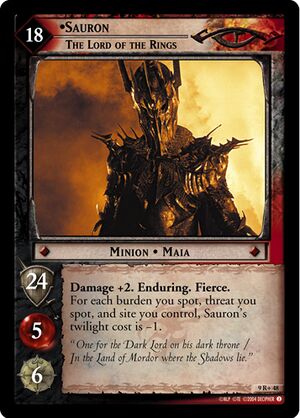
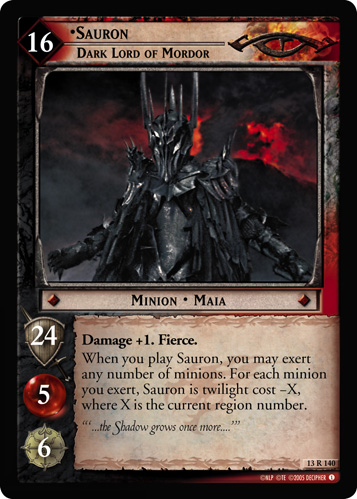 .
.Unique cards are indicated by a dot (•) to the left of the card title. This indicates that this is a unique persona, like Frodo or Sting (1R313)
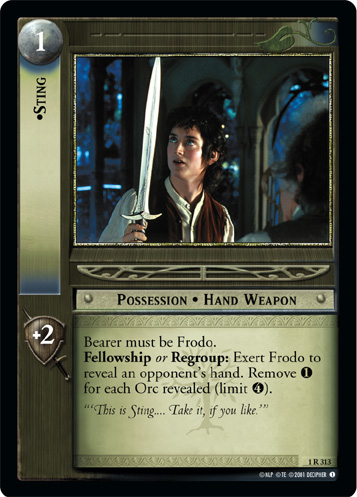 or the Balrog, rather than something generic, like a dwarf guard or a crude goblin scimitar. You cannot play a card if a unique card with the same title is currently in play and active, or if a unique card with the same name is in the dead pile. If a card doesn't have a title with a dot, it is non-unique, and has none of the limitations listed here.
or the Balrog, rather than something generic, like a dwarf guard or a crude goblin scimitar. You cannot play a card if a unique card with the same title is currently in play and active, or if a unique card with the same name is in the dead pile. If a card doesn't have a title with a dot, it is non-unique, and has none of the limitations listed here.
The title of a card is at the top of the card on character and follower cards, and along the left edge on artifact, possession, condition, and One Ring cards. If the card has a subtitle, it's in smaller text below the title (or across the horizonal center-line of the card, in the case of the One Ring). In conversation, subtitles are usually separated with a comma, so the card at the left is called "Sauron, the Lord of the Rings". Many unique cards have multiple different versions with different subtitles, but they are all considered the same unique persona. If Sauron, the Lord of the Rings is in play, then you can't also play Sauron, Dark Lord of Mordor at the same time. When building your deck, you can have four copies of any card with the same title, regardless of the subtitle. In the case of Sauron, your deck could have two copies of each of Sauron, the Lord of the Rings and Sauron, Dark Lord of Mordor, three copies of one and one of the other, four of just one of them, but not four each of both.
In a typical two-player game, your Free Peoples cards are never active at the same time as your opponent's Free Peoples cards, and your Shadow cards are never active at the same time as your opponent's Shadow cards. This means both players can have a copy of Frodo or Aragorn out at the same time, and both players can have copies of Ithil Stone (9R+47)
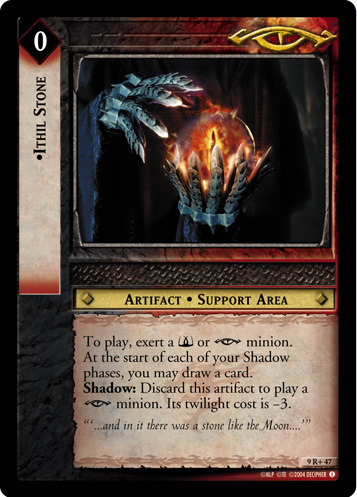 out at the same time. You never have to worry about any sort of uniqueness collision between different players' cards in a standard game.
out at the same time. You never have to worry about any sort of uniqueness collision between different players' cards in a standard game.
If you have a spare copy of a unique companion or ally that is already in play, you may play that extra copy (for no Twilight cost) in your Fellowship Phase to heal that character as long as they have one wound. This is also based on titles: you can discard Boromir, Lord of Gondor (1R96)
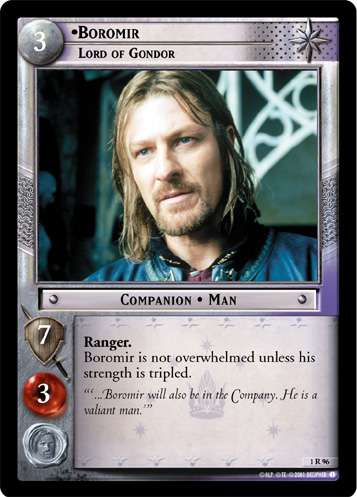 from your hand to heal a copy of Boromir, Son of Denethor (1U97)
from your hand to heal a copy of Boromir, Son of Denethor (1U97)
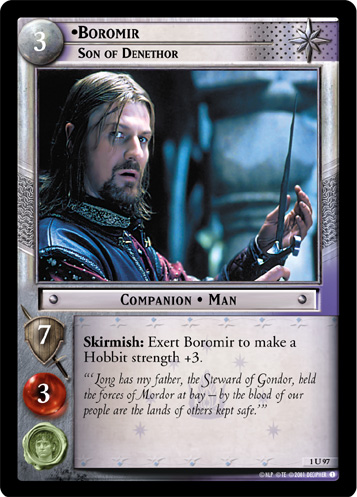 in play. Unlike some of Decipher's previous games, there's no simple way to replace a copy of a unique card in play with a different one from your hand, however, so most decks do not usually run multiple different versions of the same companion, ally, possession, or artifact unless that card has some way of removing itself from play without permanently going to the dead pile.
in play. Unlike some of Decipher's previous games, there's no simple way to replace a copy of a unique card in play with a different one from your hand, however, so most decks do not usually run multiple different versions of the same companion, ally, possession, or artifact unless that card has some way of removing itself from play without permanently going to the dead pile.
Only companions and allies can be sent to the dead pile. Other types of unique cards (particularly minions) are sent to the discard pile even if they are killed, and thus can be played again if you draw another copy or retrieve a copy from discard. Usually, a companion or ally being sent to the dead pile means that character can't be played again for the rest of the game, although cards like Sent Back (9R27)
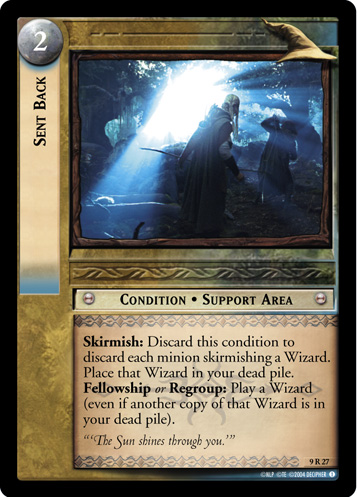 can bypass this for some characters, and a few cards like Falls of Rauros (17U146)
can bypass this for some characters, and a few cards like Falls of Rauros (17U146)
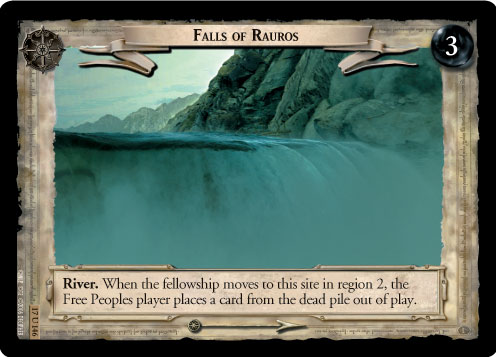 can remove a character from the dead pile, allowing them to be played a second time.
can remove a character from the dead pile, allowing them to be played a second time.
Special Cases[edit]
Cards which are stacked on other cards are not in play, and do not impact the uniqueness rule. You can stack three copies of Aragorn on The Shards of Narsil (3R44)
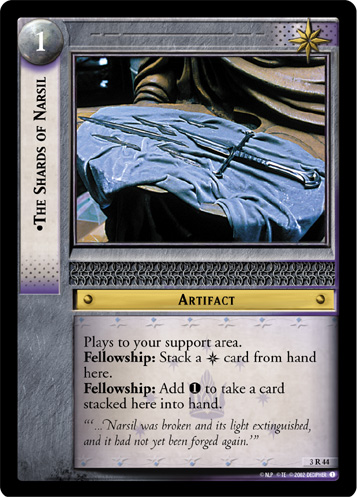 , and then you can still play Aragorn, Ranger of the North (1R89)
, and then you can still play Aragorn, Ranger of the North (1R89)
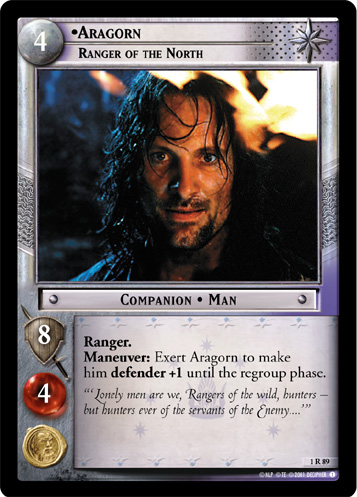 normally.
normally.
Cards being played from the dead pile are still blocked by additional copies of that persona in the dead pile. For example, Well Met Indeed (4R106)
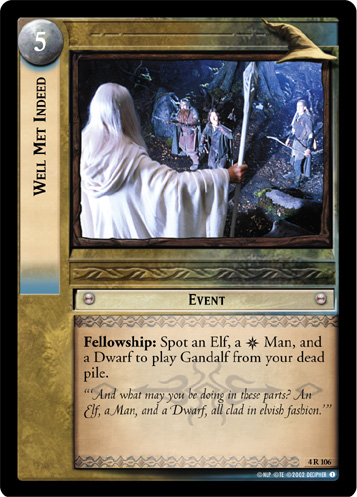 only works if you have exactly one copy of Gandalf in your dead pile. (Meduseld (6U117)
only works if you have exactly one copy of Gandalf in your dead pile. (Meduseld (6U117)
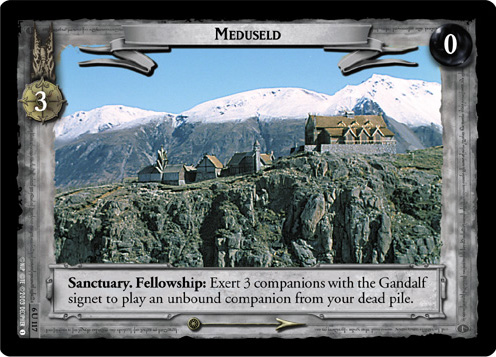 and Pinnacle of Zirakzigil (11S255)
and Pinnacle of Zirakzigil (11S255)
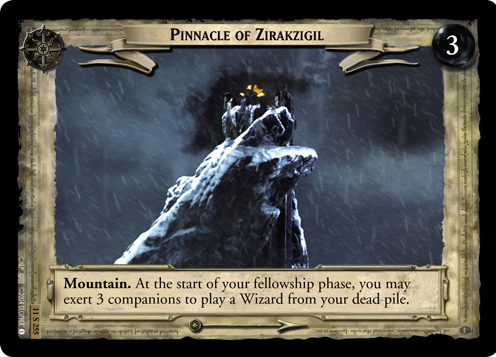 are similarly limited.) If you have two, the second copy blocks the first from being played. This is not a problem for the second ability of the later card Sent Back (9R27)
are similarly limited.) If you have two, the second copy blocks the first from being played. This is not a problem for the second ability of the later card Sent Back (9R27)
 , which specifically bypasses this rule.
, which specifically bypasses this rule.
A dead unique companion or ally still excludes other types of cards with the same name from being played. For example, you can't play The Gaffer, Master Gardener (13U151)
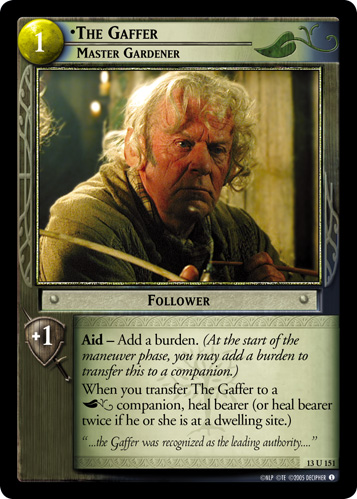 (a follower) if The Gaffer, Sam's Father (1R291)
(a follower) if The Gaffer, Sam's Father (1R291)
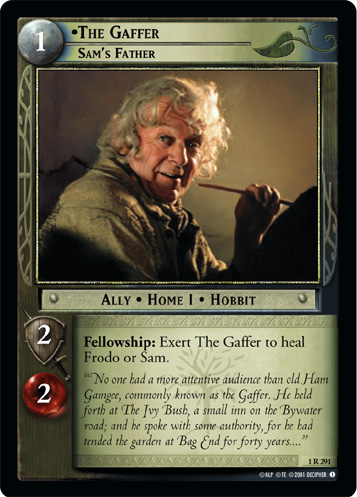 (an ally) is in the dead pile.
(an ally) is in the dead pile.
Mûmak Commander (7R152)
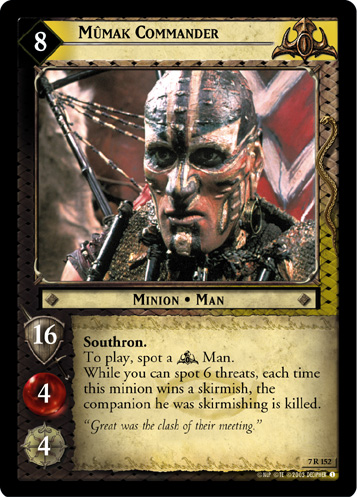 is not unique, but Mûmak Commander, Giant Among the Swertings (15R86)
is not unique, but Mûmak Commander, Giant Among the Swertings (15R86)
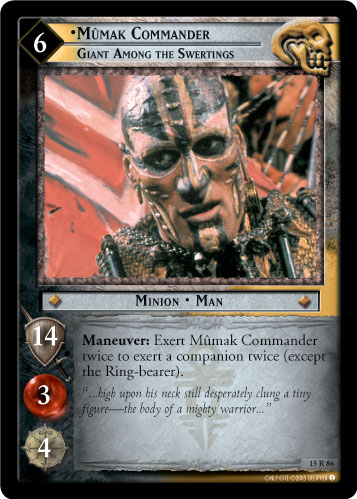 , a card with the same title, is. Because you cannot play a card if a unique card with the same title is already in play, a copy of Giant Among the Swertings in play prevents you from playing the original Mumak Commander, but not vice versa.
, a card with the same title, is. Because you cannot play a card if a unique card with the same title is already in play, a copy of Giant Among the Swertings in play prevents you from playing the original Mumak Commander, but not vice versa.
All unique personas are exclusive to Free Peoples or Shadow, save for one. The Palantír of Orthanc appears as two Shadow cards: The Palantír of Orthanc (3R67)
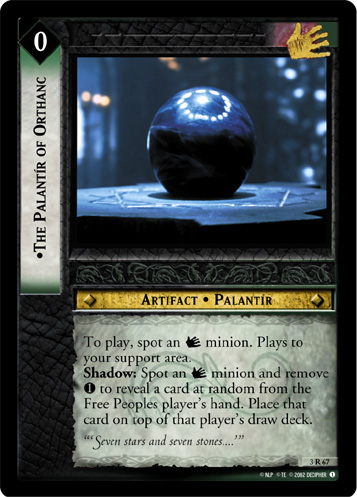 and The Palantír of Orthanc, Seventh Seeing-stone (4R166)
and The Palantír of Orthanc, Seventh Seeing-stone (4R166)
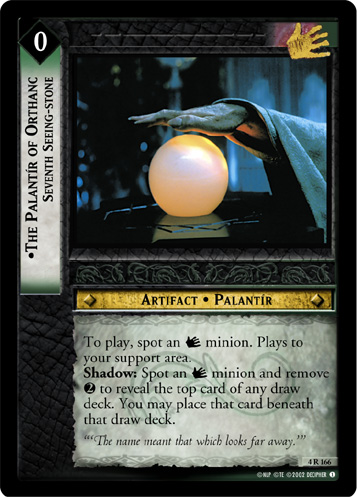 , as well as a Free Peoples card, The Palantír of Orthanc, Recovered Seeing Stone (13R36)
, as well as a Free Peoples card, The Palantír of Orthanc, Recovered Seeing Stone (13R36)
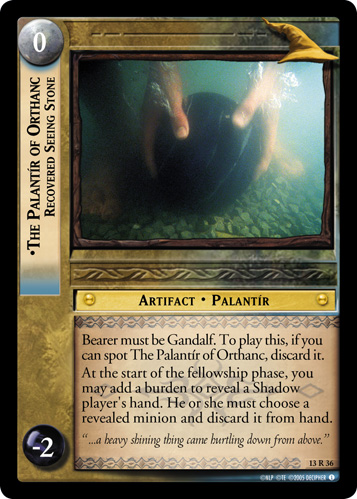 . The Free Peoples card has a special rule allowing it to replace either Shadow card, and while the Free Peoples card is in play, the Shadow card can't be (re)played by that player's opponent.
. The Free Peoples card has a special rule allowing it to replace either Shadow card, and while the Free Peoples card is in play, the Shadow card can't be (re)played by that player's opponent.
Uniqueness is strictly based on the exact card title. Seeing Stone of Orthanc (9R38)
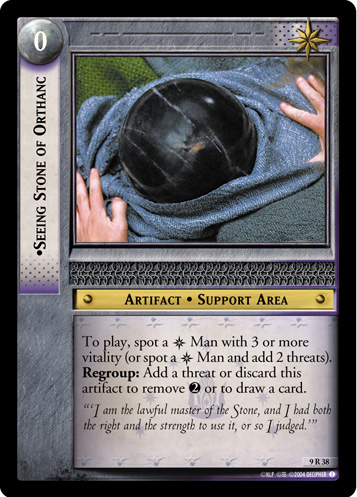 is not considered the same persona as the Palantír above, even though the card is representing the same orb from The Lord of the Rings. Likewise, The Shards of Narsil (3R44)
is not considered the same persona as the Palantír above, even though the card is representing the same orb from The Lord of the Rings. Likewise, The Shards of Narsil (3R44)
 , Narsil, Blade of the Faithful (9R+34)
, Narsil, Blade of the Faithful (9R+34)
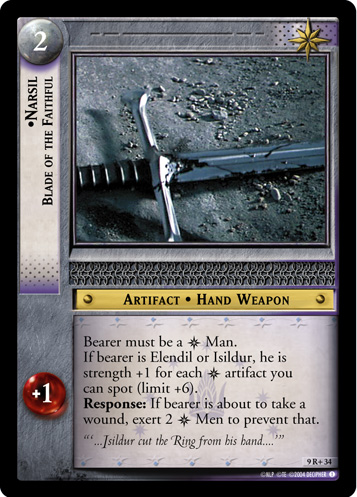 , and Andúril, Flame of the West (7R79)
, and Andúril, Flame of the West (7R79)
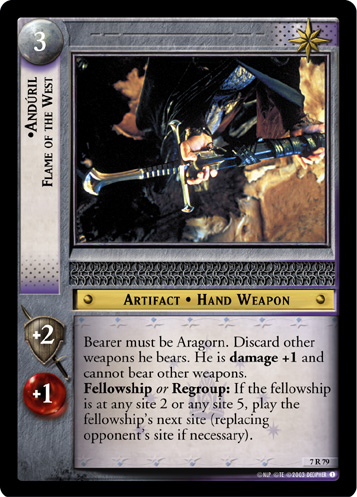 can all be in play at the same time, even though they are the same physical sword at different points. This is different from some of Decipher's other games.
can all be in play at the same time, even though they are the same physical sword at different points. This is different from some of Decipher's other games.
Gollum and Sméagol are considered separate characters in this game for all purposes. A copy of Gollum in play does not prevent Sméagol from being played and vice versa. Gollum dying does not affect Sméagol, and a copy of Sméagol in the dead pile does not prevent Gollum from being played. This is intentional: Gollum ever works at cross-purposes with himself.
All cards with the same title (but not subtitle) are considered the same card for deck-building and uniqueness, with one single exception. Orc Pursuer (5C108)
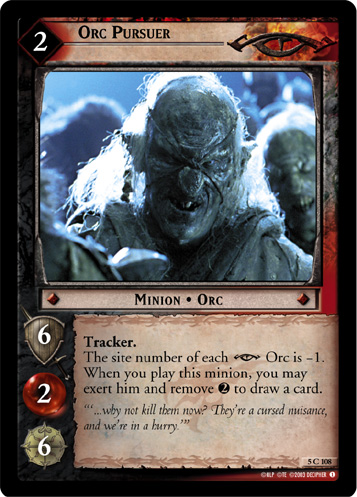 from Battle of Helm's Deep and Orc Pursuer (7C303)
from Battle of Helm's Deep and Orc Pursuer (7C303)
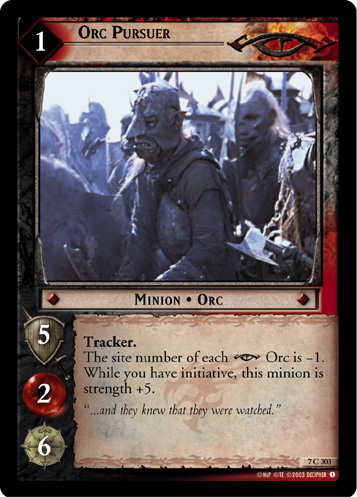 from Return of the King were given the same title by accident, and are considered separate cards. You can have eight cards named "Orc Pursuer" in your deck, as long as they're four copies of each of the two versions.
from Return of the King were given the same title by accident, and are considered separate cards. You can have eight cards named "Orc Pursuer" in your deck, as long as they're four copies of each of the two versions.
The title of Boromir, My Brother (4R111)
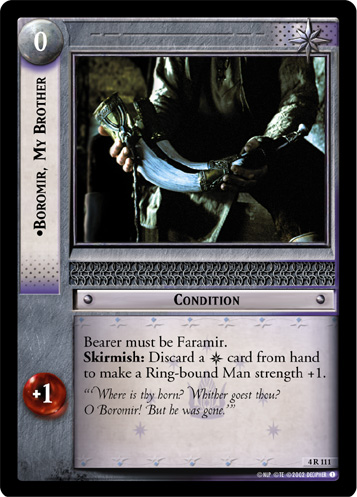 is "Boromir, My Brother" and not "Boromir". While subtitles are usually offset with a comma in conversation (and on this wiki), on the card itself the title and subtitle are in different places. No condition in this game has a subtitle. As a result, it's perfectly legal to play this condition representing Faramir mourning his brother's death alongside a cheerfully living Boromir, Lord of Gondor (1R96)
is "Boromir, My Brother" and not "Boromir". While subtitles are usually offset with a comma in conversation (and on this wiki), on the card itself the title and subtitle are in different places. No condition in this game has a subtitle. As a result, it's perfectly legal to play this condition representing Faramir mourning his brother's death alongside a cheerfully living Boromir, Lord of Gondor (1R96)
 . You can also run four copies of Boromir, My Brother with four copies total of any mix of versions of Boromir.
. You can also run four copies of Boromir, My Brother with four copies total of any mix of versions of Boromir.
Comprehensive Rules 4.0[edit]
Many character, possession, artifact, and condition cards represent a thing that there is only one of. Such a card has a dot (•) before the card title and is unique. When a unique card is in play and currently active, you cannot play another card that has the same title.
You may have only one card with the card title of •Gandalf in play at one time. Other players may also have a card with the title of •Gandalf in play, but only one is allowed per player.
Two cards represent the same thing if they have the same card title (even if their subtitles or collector’s info are different) or they have the same collector’s info (even if their titles and subtitles are different). Two cards can have the same card title even if they are in different languages.
The cards Gandalf's Staff, Walking Stick (4R91)
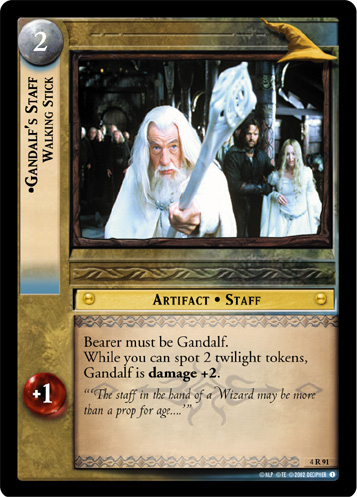 and Gandalf's Staff (2R22)
and Gandalf's Staff (2R22)
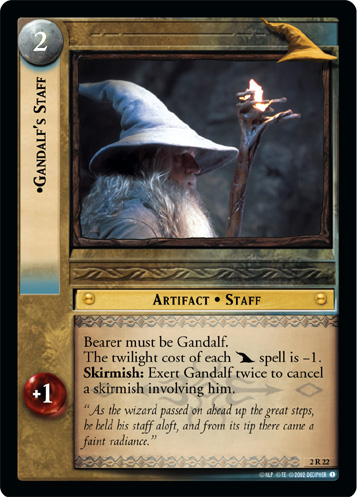 (no subtitle) represent the same thing.
(no subtitle) represent the same thing.
- unique section
All cards that do not have a dot (•) before their card title are non-unique. This means that all players may have multiple copies of those cards in play at one time.
If you have multiple copies of a non-unique card in play, the effects of those copies are cumulative.
- non-unique section
When you have a unique companion or ally in your dead pile, you cannot play another copy of that card, or any other card with the same title. You may play another copy of a non-unique card that is in your dead pile.
If you have more than one copy of a unique companion in your dead pile, you can't play one of them from your dead pile.
- dead pile section
As a fellowship action during your fellowship phase, you may spot a unique companion or unique ally with at least one wound and discard a card from your hand with the same card title(it may have a different subtitle) to heal that character.
- discard to heal section
Stacked cards are not in play and are not active. You cannot spot them. They do not count for uniqueness. A stacked unique card may be in play elsewhere. Multiple copies of the same unique card may be stacked together.
- stack section
[Orc Pursuer (7C303)
 ] from The Return of the King set has the same name as Orc Pursuer (5C108)
] from The Return of the King set has the same name as Orc Pursuer (5C108)
 from the Battle of Helm's Deep set. You may have up to four copies of 5C108 and up to four copies of 7C303 in your deck.
from the Battle of Helm's Deep set. You may have up to four copies of 5C108 and up to four copies of 7C303 in your deck.
- ORC PURSUER section
| Game Concepts |
|---|
| Play Area | ||||
|---|---|---|---|---|
| Piles | Draw Deck | Adventure Deck | Discard Pile | Dead Pile |
| Other | Fellowship | Support Area | Twilight Pool | Adventure Path |
| The Turn Sequence | ||||||
|---|---|---|---|---|---|---|
| Fellowship Phase | Shadow Phase | Maneuver Phase | Archery Phase | Assignment Phase | Skirmish Phase | |